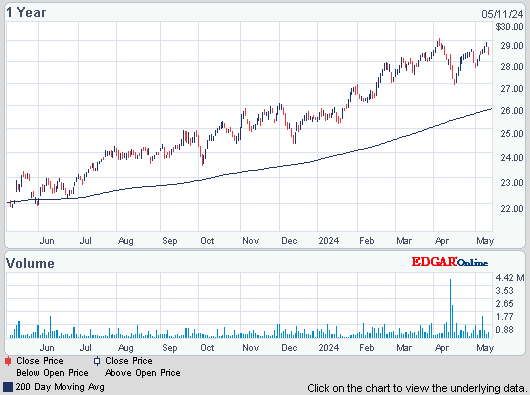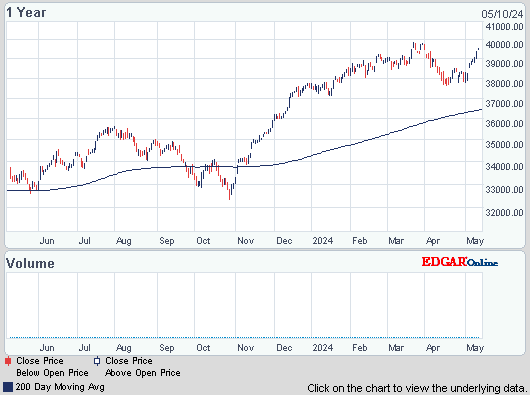Dow tumbled 136 (finishing near the lows), decliners over advancers almost 4-1 & NAZ lost 37. The MLP index was off 3+ to the 442s & the REIT index gained 1 to the 268s. Junk bond funds were lower & Treasuries were mixed. Oil fell again & gold rose from money seeking safety.
AMJ (Alerian MLP Index tracking fund)

![Live 24 hours gold chart [Kitco Inc.]](http://www.kitco.com/images/live/gold.gif)


Photo: Bloomberg
The pres reiterated that he won’t negotiate with Reps over the partial gov shutdown & the US debt limit as Senate Dems began preparing for a test vote on a clean debt-ceiling bill. Many gov services have been shuttered for a week & the country is 10 days away from running out of borrowing authority. Reps are insisting on changing Obamacare, while Obama refuses to engage in discussions about policy riders as a condition for opening the gov or raising the debt limit. “We’re not going to negotiate under the threat of economic catastrophe,” Obama said TODAY. Senate Dems could introduce legislation that gives Obama the authority to raise the debt ceiling unless 2/3 of Congress disapproves (source: a leaker) & an initial test vote could occur as soon as Fri. Gene Sperling, director of the president’s National Economic Council, said that while the administration prefers a long-term increase in the debt ceiling, it wouldn’t rule out a temporary one. Should Congress fail to pass a debt-ceiling increase that the president can sign, the ensuing default would be an “extraordinarily negative event for our economy” & the world.
Obama Says No Negotiations Until Debt Ceiling, Funding Settled

Photo: Bloomberg
The G-20 economies identified market turmoil from central banks’ withdrawal of monetary stimulus as a key risk to the global financial system, according to a draft communique. “Excessive market volatility and tightening of financing conditions in response to an approaching eventual transition toward the monetary policy normalization in advanced economies is an important risk,” according to the preliminary statement. “We will ensure that future changes to monetary policy settings will continue to be carefully calibrated and clearly communicated.” The draft will be used as a basis for discussions on Oct 10-11 at the G-20 meeting. This coincides with the annual meetings of the IMF & the World Bank. “While the global recovery continues, it remains uneven and fragile, with unemployment being unacceptably high in many countries,” the draft states. “There are signs of improvement in major advanced economies and evidence of slower growth in some emerging markets.” The intention of G-20 policy makers to communicate transparently comes almost a month after the Federal Reserve (FED) surprised investors by deciding not to trim its $85B-a-month bond purchase program. The concern of emerging markets is that when the FED begins tapering its bond buying, it could hurt them by sparking an exodus of cash & higher borrowing costs.
G-20 Draft Says QE Withdrawal Volatility Poses ‘Important Risk’
Consumer borrowing rose more than projected in Aug as Americans took out more loans for motor vehicle purchases & education. The $13.6B increase in credit followed a $10.4B gain in Jul, the FED reported. The forecast called for a $12B advance. Non-revolving debt, which includes financing for college tuition & motor vehicles, climbed $14.5B. The boost to household wealth from improved home values & stock-market gains has put consumers in a position to take advantage of cheaper borrowing costs for major purchases such as automobiles. Credit-card lending declined for a 3rd month, showing Americans are being deliberate in taking on more debt to finance other purchases. Revolving debt, which includes credit-card spending, decreased by $883M in Aug after falling $1.8B the month before. The string of 3 straight declines in revolving loans is the longest since consecutive decreases to Nov 2010. Non-revolving credit increased in Aug after climbing $12.2B a month earlier. The pickup in non-revolving lending was a reflection of stronger auto sales & an increase in school loans. Cars & light trucks sold in Aug at an annualized pace of 16M, the strongest in almost 6 years.
Consumer Credit in U.S. Rises $13.6 Billion on Car Purchases
Confusion in DC reached new heights. Nobody knows what is going on or how to deal with 2 enormous fiscal messes. Saving face & coming out a victor is more important that doing what is best for the country. New ideas to use more Scotch Tape to patch together some of this & some of that will be seen as a brilliant solution by the victor. Given the way the stock market has been reacting all year, that can be used as an excuse to take Dow up another couple hundred points. But meaningful, permanent help would still be far away. Remember the sequester solution proposed by the pres a couple of years ago? Dow is on defense & down almost 200 in Oct.
Dow Jones Industrials

AMJ (Alerian MLP Index tracking fund)
Treasury yields:
U.S. 3-month |
0.02% | |
U.S. 2-year |
0.34% | |
U.S. 10-year |
2.63% |
| CLX13.NYM | ...Crude Oil Nov 13 | ...102.62 | (1.2%) |
![Live 24 hours gold chart [Kitco Inc.]](http://www.kitco.com/images/live/gold.gif)


Photo: Bloomberg
The pres reiterated that he won’t negotiate with Reps over the partial gov shutdown & the US debt limit as Senate Dems began preparing for a test vote on a clean debt-ceiling bill. Many gov services have been shuttered for a week & the country is 10 days away from running out of borrowing authority. Reps are insisting on changing Obamacare, while Obama refuses to engage in discussions about policy riders as a condition for opening the gov or raising the debt limit. “We’re not going to negotiate under the threat of economic catastrophe,” Obama said TODAY. Senate Dems could introduce legislation that gives Obama the authority to raise the debt ceiling unless 2/3 of Congress disapproves (source: a leaker) & an initial test vote could occur as soon as Fri. Gene Sperling, director of the president’s National Economic Council, said that while the administration prefers a long-term increase in the debt ceiling, it wouldn’t rule out a temporary one. Should Congress fail to pass a debt-ceiling increase that the president can sign, the ensuing default would be an “extraordinarily negative event for our economy” & the world.
Obama Says No Negotiations Until Debt Ceiling, Funding Settled

Photo: Bloomberg
The G-20 economies identified market turmoil from central banks’ withdrawal of monetary stimulus as a key risk to the global financial system, according to a draft communique. “Excessive market volatility and tightening of financing conditions in response to an approaching eventual transition toward the monetary policy normalization in advanced economies is an important risk,” according to the preliminary statement. “We will ensure that future changes to monetary policy settings will continue to be carefully calibrated and clearly communicated.” The draft will be used as a basis for discussions on Oct 10-11 at the G-20 meeting. This coincides with the annual meetings of the IMF & the World Bank. “While the global recovery continues, it remains uneven and fragile, with unemployment being unacceptably high in many countries,” the draft states. “There are signs of improvement in major advanced economies and evidence of slower growth in some emerging markets.” The intention of G-20 policy makers to communicate transparently comes almost a month after the Federal Reserve (FED) surprised investors by deciding not to trim its $85B-a-month bond purchase program. The concern of emerging markets is that when the FED begins tapering its bond buying, it could hurt them by sparking an exodus of cash & higher borrowing costs.
G-20 Draft Says QE Withdrawal Volatility Poses ‘Important Risk’
Consumer borrowing rose more than projected in Aug as Americans took out more loans for motor vehicle purchases & education. The $13.6B increase in credit followed a $10.4B gain in Jul, the FED reported. The forecast called for a $12B advance. Non-revolving debt, which includes financing for college tuition & motor vehicles, climbed $14.5B. The boost to household wealth from improved home values & stock-market gains has put consumers in a position to take advantage of cheaper borrowing costs for major purchases such as automobiles. Credit-card lending declined for a 3rd month, showing Americans are being deliberate in taking on more debt to finance other purchases. Revolving debt, which includes credit-card spending, decreased by $883M in Aug after falling $1.8B the month before. The string of 3 straight declines in revolving loans is the longest since consecutive decreases to Nov 2010. Non-revolving credit increased in Aug after climbing $12.2B a month earlier. The pickup in non-revolving lending was a reflection of stronger auto sales & an increase in school loans. Cars & light trucks sold in Aug at an annualized pace of 16M, the strongest in almost 6 years.
Consumer Credit in U.S. Rises $13.6 Billion on Car Purchases
Confusion in DC reached new heights. Nobody knows what is going on or how to deal with 2 enormous fiscal messes. Saving face & coming out a victor is more important that doing what is best for the country. New ideas to use more Scotch Tape to patch together some of this & some of that will be seen as a brilliant solution by the victor. Given the way the stock market has been reacting all year, that can be used as an excuse to take Dow up another couple hundred points. But meaningful, permanent help would still be far away. Remember the sequester solution proposed by the pres a couple of years ago? Dow is on defense & down almost 200 in Oct.
Dow Jones Industrials
I’m a huge fan of INO their service Marketclub! This isn’t a stripped down version, everything in MarketClub is available to you. I don’t want to give everything away, but you’ll have unlimited access to my favorite three tools: Trade Triangles, Smart Scan, and Alerts! The best part is that the MarketClub customer support team will be providing UNLIMITED support! You can call or email for an instant response to any question, comment or concern.
Here’s that link:
https://club.ino.com/join/specialtrial/index_free.html?a_aid=CD3289&a_bid=359ef9a3
I’d recommend you jump on this now.








No comments:
Post a Comment